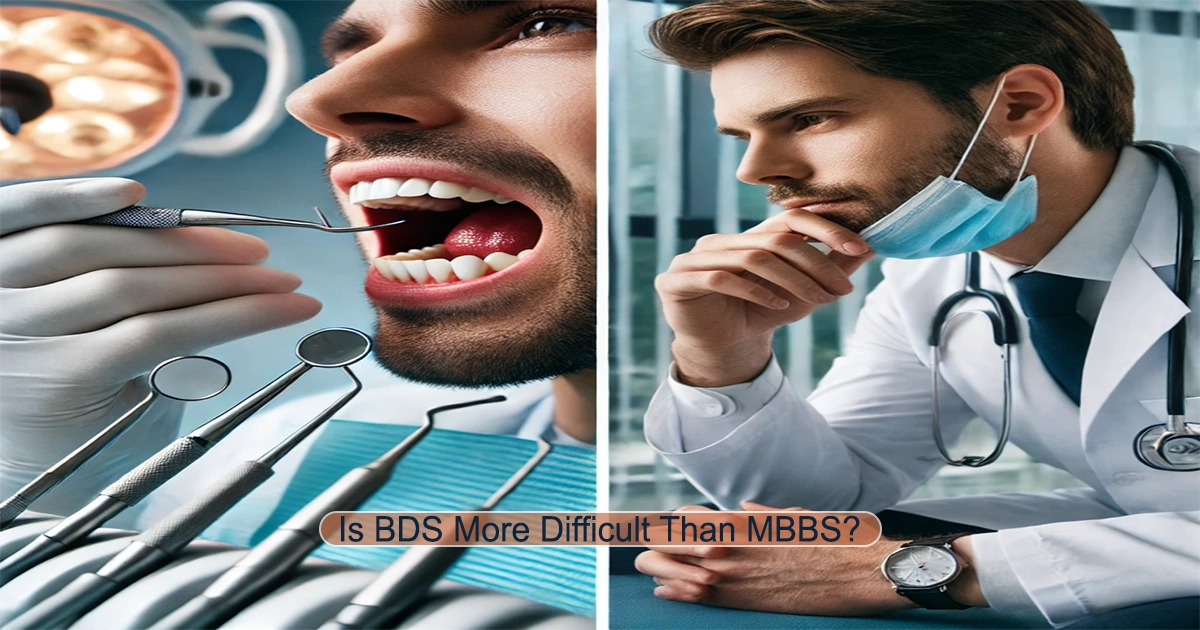
Is It Worth Studying MBBS in China
- 4th October
- 35

When it comes to choosing a career in the medical field, two popular courses are MBBS (Bachelor of Medicine, Bachelor of Surgery) and BDS (Bachelor of Dental Surgery). Aspiring medical professionals often wonder which degree is more difficult. This article will dive deep into the challenges, coursework, and scope of both BDS and MBBS to help you understand which one might be more challenging.
BDS, or Bachelor of Dental Surgery, is a professional degree in dentistry. The course focuses on dental care, oral health, and the treatment of dental diseases. It involves both theoretical studies and hands-on training in dental procedures. Typically, BDS courses last 4 to 5 years, including a mandatory internship.
MBBS, or Bachelor of Medicine, Bachelor of Surgery, is the primary medical degree to become a certified doctor. The program is much broader than BDS as it covers general medicine, surgery, and patient care in various medical fields. The MBBS program spans about 5 to 6 years, including a year of internship or residency training.
The first major difference between BDS and MBBS is the breadth of the coursework. MBBS students study various medical disciplines, from anatomy to pharmacology, pathology, surgery, and general medicine. On the other hand, BDS students concentrate on the oral and dental health of patients, learning about oral surgery, prosthodontics, orthodontics, and related fields.
Due to the more extensive curriculum, MBBS is considered more intense in terms of volume. However, the hands-on procedures and intricate work required in BDS can make it just as demanding.
Both MBBS and BDS degrees require practical training, but the areas of focus differ significantly. In BDS, practical training is mostly focused on dental procedures, patient handling, and oral surgeries. Students get ample opportunities to work directly with dental patients.
In MBBS, the practical training is far more varied and involves rotations across different medical specialties like surgery, pediatrics, gynecology, and general medicine. This adds to the workload and complexity of MBBS training, making it broader but also more difficult to master in all aspects.
Comparing the difficulty of BDS and MBBS depends on individual interests and capabilities. Here are a few points to consider:
Ultimately, neither BDS nor MBBS can be considered universally "harder" than the other. It depends on where your interests lie: if you are more focused on oral health and surgery, BDS will be the more rewarding path. However, if you are interested in general medicine and a broader medical career, MBBS might suit you better.
The career prospects after MBBS and BDS also vary. With MBBS, you can become a general physician, surgeon, or specialist, while BDS graduates become dentists or dental surgeons. Both fields offer ample opportunities but also come with their own set of challenges.
MBBS graduates often need to complete postgraduate specializations to advance in their careers, while BDS students can start practicing dentistry after their degree and internship. The complexity of postgraduate studies can add to the workload for MBBS graduates, making the journey longer and more complex.
Whether BDS is more difficult than MBBS ultimately depends on your perspective and interests. While MBBS covers a broader range of subjects and involves more time, BDS requires a high level of skill and precision in dental practices. Both are challenging in their own way and lead to rewarding careers in the medical and dental fields.
If you're passionate about working in general medicine and surgery, MBBS is the right choice. But if you're more interested in dental health and surgeries, BDS might be the path for you.
Introduction
What Is BDS?
What Is MBBS?
Coursework Comparison: BDS vs MBBS
Practical Training and Internship
Difficulty Level: Is BDS Harder Than MBBS?
Career Prospects
Conclusion